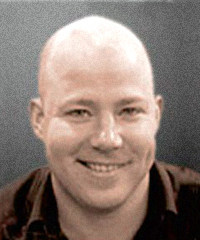Sanford and Bhalla Named Ellison Medical Foundation New Scholars
The Ellison Medical Foundation has named MCD Biology Professors Jeremy Sanford and Needhi Bhalla as two of its New Scholars in Aging for 2009. Sanford's award involves investigation of the role of toxic RNA in aging-related disease, while Bhalla will examine how mechanisms involved in nuclear organization and regulation of meiotic recombination impact aging.
Needhi Bhalla: Nuclear Organization and Regulation of Meiotic Recombination
 Loss of reproductive fitness is a hallmark of aging, whether in from yeast or in humans. Not only does aging result in fewer progeny, it can also affect “quality of life”—literally in this case, as progeny that are produced late in life may be inviable or otherwise less fit. Women over a certain age are at a higher risk for miscarriages or bearing children with developmental disorders, such as Down and Klinefelter’s syndromes. We also know that he offspring of older fathers have a higher risk of neurodevelopmental disorders, such as schizophrenia and autism. Yet, little is known about the molecular mechanisms that underlie these phenomena. Bhalla is convinced that the misregulation of events in meiosis are likely contributors to these problems.
Loss of reproductive fitness is a hallmark of aging, whether in from yeast or in humans. Not only does aging result in fewer progeny, it can also affect “quality of life”—literally in this case, as progeny that are produced late in life may be inviable or otherwise less fit. Women over a certain age are at a higher risk for miscarriages or bearing children with developmental disorders, such as Down and Klinefelter’s syndromes. We also know that he offspring of older fathers have a higher risk of neurodevelopmental disorders, such as schizophrenia and autism. Yet, little is known about the molecular mechanisms that underlie these phenomena. Bhalla is convinced that the misregulation of events in meiosis are likely contributors to these problems.
Meiosis is a specialized cell division in which a diploid cell gives rise to haploid gametes, such as eggs and sperm. To ensure that chromosomes segregate appropriately during meiosis, homologous chromosomes undergo recombination, the exchange of genetic material. Bhalla's lab has producedevidence that proteins associated with the nuclear envelope regulate meiotic recombination. These proteins often localize chromosomal loci to the periphery of the nucleus. This evidence led Bhalla to speculate that the large-scale organization of chromosomes within the nucleus affects recombination. More importantly, defects in these and other proteins at the nuclear envelope have been linked to aging and there is a growing body of literature linking loss of nuclear integrity with aging.
Bhalla believes that a potential explanation for loss of reproductive fitness lies in misregulation of meiotic recombination in response to aging-induced loss of nuclear integrity. Her lab will use Ellison support to characterize the role of nuclear organization in regulating meiotic recombination, 2) assess meiotic recombination in aging animals, as well as in mutants that extend and shorten lifespan, and 3) identify additional factors involved in age-dependent regulation of meiotic recombination. We perform our experiments using the nematode worm C. elegans as a model organism, which provides genetic, biochemical and cytological tools to address the question of how aging affects meiotic recombination and genomic stability.
Jeremy Sanford: Post Transcriptional Control of Gene Expression
 Accumulation of somatic mutations during our life history contributes to the stochastic nature of aging and plays a key role in the onset of disease. Sanford and his laboratory try to understand how mutations induce disease phenotypes, a question directly relevant to many aspects of aging research. For their Ellison research, they are investigating the hypothesis that disease-causative point mutations induce aberrant processing of messenger RNA by disrupting the specificity of protein-RNA interactions. The first step towards elucidating the impact of disease-causing mutations is to map sites of RNA-protein interactions occurring in the context of living cells. These comprehensive maps are used to identify disease-causing mutations with the potential to abolish or create protein-binding sites within RNA transcripts. Sanford and his colleagues create computational predictions of toxic RNA elements, with the predictions validated in the laboratory, using patient-derived cell lines to assay RNA processing of the endogenous disease-gene. Sanford is convinced that work in this area will improve our understanding of the basic mechanisms governing gene expression and directly translate to improved diagnosis and treatment of aging related diseases.
Accumulation of somatic mutations during our life history contributes to the stochastic nature of aging and plays a key role in the onset of disease. Sanford and his laboratory try to understand how mutations induce disease phenotypes, a question directly relevant to many aspects of aging research. For their Ellison research, they are investigating the hypothesis that disease-causative point mutations induce aberrant processing of messenger RNA by disrupting the specificity of protein-RNA interactions. The first step towards elucidating the impact of disease-causing mutations is to map sites of RNA-protein interactions occurring in the context of living cells. These comprehensive maps are used to identify disease-causing mutations with the potential to abolish or create protein-binding sites within RNA transcripts. Sanford and his colleagues create computational predictions of toxic RNA elements, with the predictions validated in the laboratory, using patient-derived cell lines to assay RNA processing of the endogenous disease-gene. Sanford is convinced that work in this area will improve our understanding of the basic mechanisms governing gene expression and directly translate to improved diagnosis and treatment of aging related diseases.
